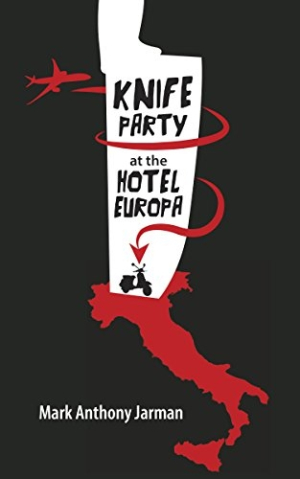Knife Party at the Hotel Europa
Jarman’s prose circles ideas, revisiting them, adding flesh and depth to what seemed to be a fleeting character or encounter.
Divorced and abandoned by the love he thought would replace his marriage, the narrator of this collection of linked stories leaves for a six-month sojourn to Italy in the hopes of making sense of the next moments and chapters of his life. He is unmoored, horny, and brooding, alternately amusing and horrifying in his needs and assessment of the world around him.
Mark Anthony Jarman, a celebrated Canadian writer and a graduate of the Iowa Writer’s Workshop, here creates his own sort of genre, not quite short stories, not quite novel. The book resists a traditional narrative in favor of a more episodic, stream-of-consciousness style that favors observation and association over pat endings. Though easy to read, the book rewards repeated readings when what seemed a small setting detail or character sketch in the beginning becomes a pivotal idea later in the text.
The narrator uses Rome as a base from which he moves, often in the company of his cousin Eve, to whom he is attracted. They suffer Italian trains in the summer, delight in the food and art, enjoy the company of both natives and tourists, and learn the story of an Iraqi who, nearly crushed to death by an American tank, lost her fiancé in a bombing and sought refuge in Italy. Eve and the narrator kayak along the coast as refugees wash up on shore dressed in suits, and as a young girl with braids is tied to a line while divers collect the rest of the bodies. They stand on ground where hundreds of years before, people were reduced to ashen statues from the sudden leap of lava thrust upon them. Everywhere, the narrator encounters the palimpsest—story set upon story. This is the reality of Rome, where nothing can be built without discovering something else, where the narrator cannot engage a new love without remembering his past, where old tragedy begets new tragedy.
Jarman’s prose has the momentum of travel, with vivid images and flashes of understanding about another way of life.
Reviewed by
Camille-Yvette Welsch
Disclosure: This article is not an endorsement, but a review. The publisher of this book provided free copies of the book to have their book reviewed by a professional reviewer. No fee was paid by the publisher for this review. Foreword Reviews only recommends books that we love. Foreword Magazine, Inc. is disclosing this in accordance with the Federal Trade Commission’s 16 CFR, Part 255.

